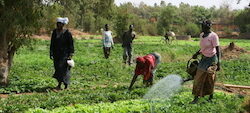
According to the Food and Agriculture Organization (FAO), about two-thirds of the African population depend on family farms, comprising of 62% of the land, for food and employment.
These farmers depend mostly on traditional modes of farming such as non-use of irrigation, chemical fertilizers, and commercial seed varieties. As such, they contribute to ecosystem preservation and environmental protection and are crucial for food security in the region. However, these same farmers are also part of the most marginalized and vulnerable farmers in the world, particularly the women and the youth. Policies that support control over resources by these family farmers are needed to empower farmers in the region.
Thus, three regional initiatives are currently being implemented by FAO in Africa to address family farmers’ challenges in the region:
- Regional Initiative 1: “Africa’s Commitment to End Hunger by 2025” (“aims to accelerate the implementation of the strategy and roadmap of the Malabo Declaration at Regional Economic Communities and participating countries levels” and “to strengthen the programming, mechanisms, capacity and delivery of actions needed to operationalize commitment to end hunger by 2025”);
- Regional Initiative 2: “Sustainable Production Intensification and Value Chain Development in Africa” (“focuses on sustainable intensification of production and the associated measures needed to address post-production issues” and “aims at creating decent job and entrepreneurship opportunities for young women and men”); and
- Regional Initiative 3: “Building Resilience in Africa’s Drylands” (“aims to strengthen the resilience of vulnerable people in drylands to threats and crises through improving institutional and community/household capacity for resilience and responding to disasters and crises”).
For more information on family farning in Africa, please visit the Family Farming Knowledge Platform Africa.
Photo credit: FAO/Ahmed Ouoba

